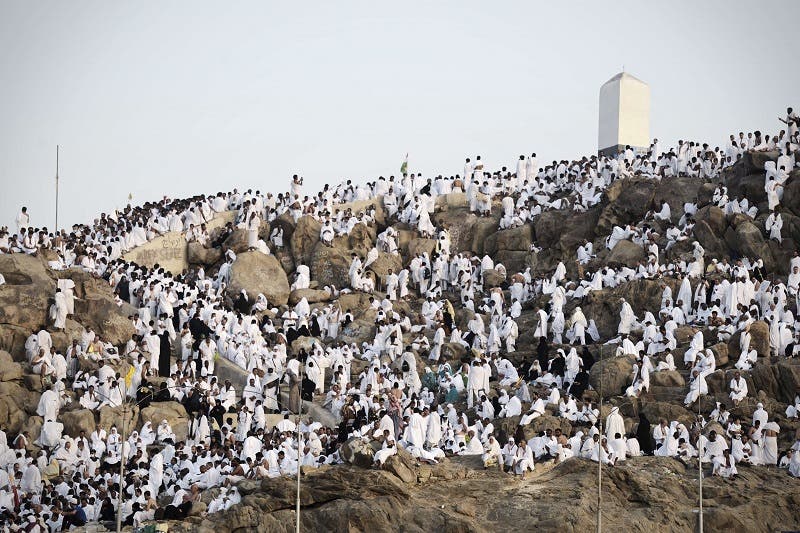Hazrat Abu Huraira(radhiyallahu anhu) reports that Rasullullah (Sallallahu Alaiyhi Wassallam) said:
“Whoever performs Hajj for the sake of pleasing Allah and therein utters no word of evil, nor commits any evil deed, shall remain from it as free from sin as the day on which his mother gave birth to him.’
Hazrat Abu Huraira (radhiyallahu anhu) reports that Rasullullah (Salallahu Alaiyhi Wassallam) said:
“Verily there shall be no reward for a righteous pilgrimage except Jannah”
Hazrat Ayesha (radhiyallahu anha) reports that Rasullullah (sallallahu alaiyhi wassallam) said:
“There is no day in which Allah sets free more souls from the fire of hell than on the day of Arafaat. And on that day Allah draws near to the earth and by way of exhibiting His pride remarks to the Angels: “What is the desire of these servants of mine.”
“Hazrat Talhaa (radhiyallahu anhu) reports that Rasullullah (Salallahu Alaihi Wassallam) said:
“Apart from the day of the battle of Badr there is no day on which the Shaytaan is seen more humiliated, more rejected. More depressed and more infuriated, than on the day of Arafaat, and indeed all that is only because of beholding the abundance of descending mercy (on that day) and Allah’s forgiveness of the great sins of the servants.” (Mishkaat)
Hazrat Ibn Shimaastah (radhiyallahu anhu) reports we were present around Hazrat Amr Ibn al-Aas (radhiyallahu anhu) before he passed away. He cried for a long time and then related the story of his embracing Islam. He said: “When Allah caused Islam to enter my heart, I came to Rasullullah (sallallahu alaiyhi wassallam) and said: ‘O messenger of Allah, put forth your hand that I may swear allegiance. ‘When Rasullullah (sallallahu alaiyhi wassallam) stretched forth his hand, I withheld mine. Rasullullah (sallallahu alaiyhi wassallam) inquired: “What troubles you ‘O Amr?” I said: I went to make a condition that Allah shall forgive my previous sins”. Rasullullah (sallallahu alaiyhi wassallam) replied: ‘O Amr, do you then not know that Islam washes away all sins committed in disbelief, and that the Hijrat (migration) washes away all sins committed before Hajj?”
Hazrat Sahl bins Sa’ad (radhiyallahu anhu) reports that Rasullullah (Salallahu Alaihi Wassallam) said:
“When a Muslim shouts Labbaik, then verily every stone, tree and all the ground to his right and to his left recites the same, and this continues till that cry reaches the end of the earth,”
Hazrat Abu Moosa (radhiyallahu anhu) reports that Rasullullah (sallallahu alaiyhi wassallam) said:
“The Hajji shall intercede on behalf of four hundred families or he said four hundred people from his family, and verily does he return from Hajj (sinless) as on the day his mother gave birth to him.”
Hazrat Ibn Umar (radhiyallahu anhu) report that Rasullullah (sallallahu alaiyhi wassallam) said:
“When you meet a Hajji (on his way home) then greet him, shake hands with him and ask him to beg forgiveness of Allah on your behalf before he enters his home, for his prayer for forgiveness is accepted since he is forgiven by Allah for his sins.”
Hazrat Buraidah (radhiyallahu anhu) reports that Rasullullah (sallallahu alaiyhi wassallam) said:
“The expenses incurred during Hajj is like that incurred in Jihaad; rewarded seven hundred times.”
Hazrat Jaabir (radhiyallahu anhu) reports that Rasullullah (sallallahu alaiyhi wassallam) said:
“A Hajji never becomes poor and destitute.”
Hazrat Aayesha (radhiyallahu anha) reports that she once sought permission from Rasullullah (Salallahu Alaiyhi Wassallam) to go for Jihaad. Rasullullah (Salallahu Alaiyhi Wassallam) replied: “Your Jihaad is Hajj.”
Hazrat Ibn Abbaas (radhiyallahu anhu) reports that Rasullullah (sallallahu alaiyhi wassallam) said:
“Whoever desires to perform Hajj, should hasten towards performing it.”
Hazrat Abu Hurairah (radhiyallahu anhu) reports that Rasullullah (Salallahu Alaihi Wassallam) said:
“Whoever sets forth in a journey to perform Hajj and passes away on route, for him shall be written the reward of a Haaji until the day of Qiyaamah; and whoever sets forth to perform Umrah and passes away on route, for him shall be written the reward of a Mu’tamir until Qiyaamah; and whoever sets forth on a journey to fight in the way of Allah and passes away on route, for him shall be written the reward of a Mujaahid until the day of Qiyaamah.”
Hazrat Ibn Abbaas (radhiyallahu anhu) reports that a Sahabiyah (a Muslim lady who saw Rasullullah (Salallahu Alaiyhi Wassallam) once said to Rasullullah (Salallahu Alaiyhi Wassallam):
“O Rasullullah (Salallahu Alaihi Wassallam), the obligation of Hajj has come at a time now when my father is a very old and weakly man. He is unable to remain seated on a camel (or horse). Can I then proceed to perform Hajj on his behalf?”
Rasullullah (Salallahu Alaiyhi Wassallam) replied: “Yes, you can.”
Another Sahabi (radhiyallahu anhu) also came with a similar request: “O Rasullullah (Salallahu Alaiyhi Wassallam), my sister made vow that she would perform Hajj. Now she has passed away. What should we do?”
Rasullullah(Salallahu Alaiyhi Wassallam) replied: “Should she have passed away while she owed someone something, would you have settled that debt?”
The man replied: “Yes indeed.”
Rasullullah (Sallallahu Alaiyhi Wassallam) said: “This is a debt due to Allah. Settle it.” (Mishkaat)
Hazrat Jaabir (radhiyallahu anhu) reports:
“Verily Allah causes three people to enter into Paradise through one Hajj; The deceased, (on whose behalf this Hajj is being performed) the Haaji performing it and he (the heir or others) who makes possible its performance (by financial aid).”
Source: Al-Islaah publications
Like this:
Like Loading...




